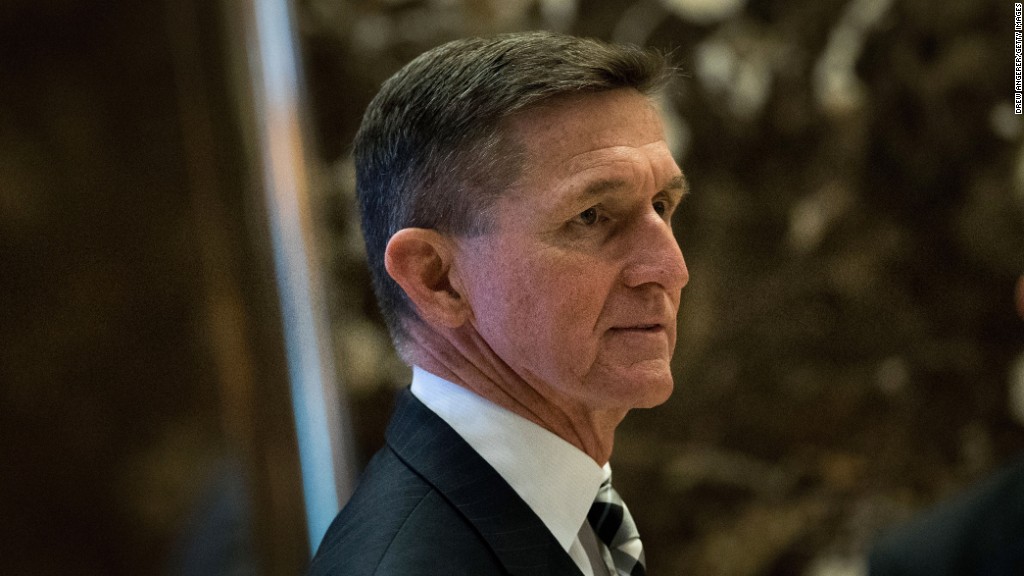
Will President Trump face questions about the scandal surrounding his now-former national security adviser Michael Flynn? Or will he skirt the issue by avoiding the press or seeking softball questions?
The Trump White House has employed several different strategies for sidestepping uncomfortable questions. There has been a rightward tilt at press conferences and briefings.
At Q&A sessions with foreign heads of state, Trump has bypassed the country's biggest newsrooms and called on reporters from conservative outlets instead.
Related: Reporters outraged over lack of Flynn questions at Trump news conference
On another occasion, last Friday, Trump claimed not to know about a bombshell Washington Post story about the Flynn controversy, almost a full day after the story was published.
At briefings, White House Press Secretary Sean Spicer has sought out friendly questioners.
And writers from right-wing sites that previously weren't credentialed at the White House have started to attend briefings.
On Monday a Trump-boosting web site called the Gateway Pundit had two staffers at the White House: Washington correspondent Lucian B. Wintrich and owner Jim Hoft. It was notable because the blog does little original reporting, instead trafficking in sensational and sometimes misleading stories.
Wintrich told The New York Times that he would be reporting "far more fairly than a lot of the very left-wing outlets that are currently occupying the briefing room."
In a comment that raised eyebrows among White House correspondents, he also said "we will be doing a little trolling of the media in general."
One of the principles of White House coverage is that a wide variety of news outlets should be represented at briefings and press conferences. Talk radio hosts and writers from liberal and conservative sites have been attending briefings for years.
Spicer has been praised by members of the press for working his way around the room and with adding the "Skype seats" for local reporters. But this strategy also decreases the number of probing questions by national news media representatives.
Related: Trump White House press briefings short? Only compared to Obama
Spicer normally starts his on-camera briefings by skipping front row outlets like The Associated Press and CNN, and calling on smaller and normally right-leaning outlets instead. On day one, he gave the first question to The New York Post; day two, LifeZette, a fledgling right-wing site by radio host Laura Ingraham; day three, The Washington Times.
He started his second week by calling on a reporter from OANN, a conservative-themed channel with an audience that isn't even measured by Nielsen. Other recipients of the first question have included The Daily Caller and Townhall, both conservative outlets. USA Today also got one of the first questions, however.
Spicer has also repeatedly started the briefings by taking questions via Skype from local reporters.
To be sure, every White House tries to limit its exposure to difficult and distracting questions. The Obama administration was scrutinized for its use of late night shows and YouTube chats to get the president's message across in low-risk situations.
What White House correspondents are noticing now, with the Trump administration, is a much more combative streak and a tendency to call on outlets that are either outwardly pro-Trump or Trump-friendly, spurning sources that strive for objectivity.
The ever-more-fractured media landscape gives Spicer and other Trump aides a greater ability to pick and choose questioners.
For example, Spicer gave an interview to Breitbart News via Facebook Live last week. Other journalists mocked it because the set-up was awkward, but it gave Spicer an outlet to recite the administration's talking points.
This kind of rightward tilt is also obvious at Trump's press conferences with foreign leaders.
At these press conferences, presidents typically take their cues from White House aides who recommend questioners. At last week's event, both of the U.S. journalists Trump called on were from Rupert Murdoch-owned outlets, the New York Post and Fox Business.
And at Monday's press conference, the U.S. journalists were from a local TV station and the conservative site The Daily Caller. Neither journalist asked about Flynn, which spurred outrage among other members of the press corps.


